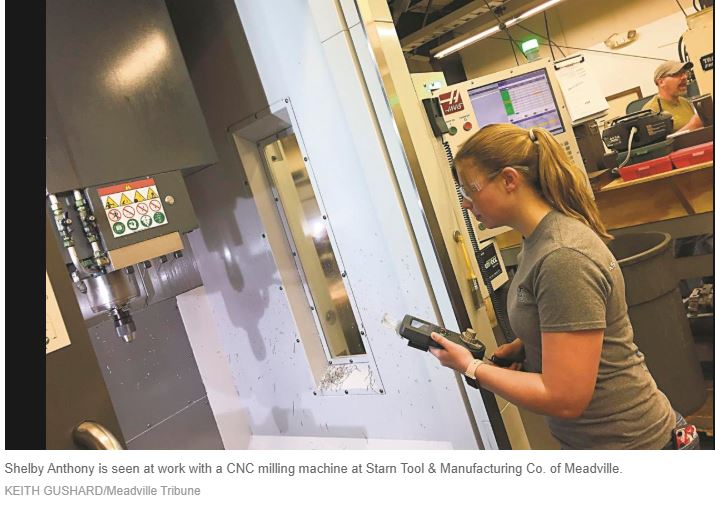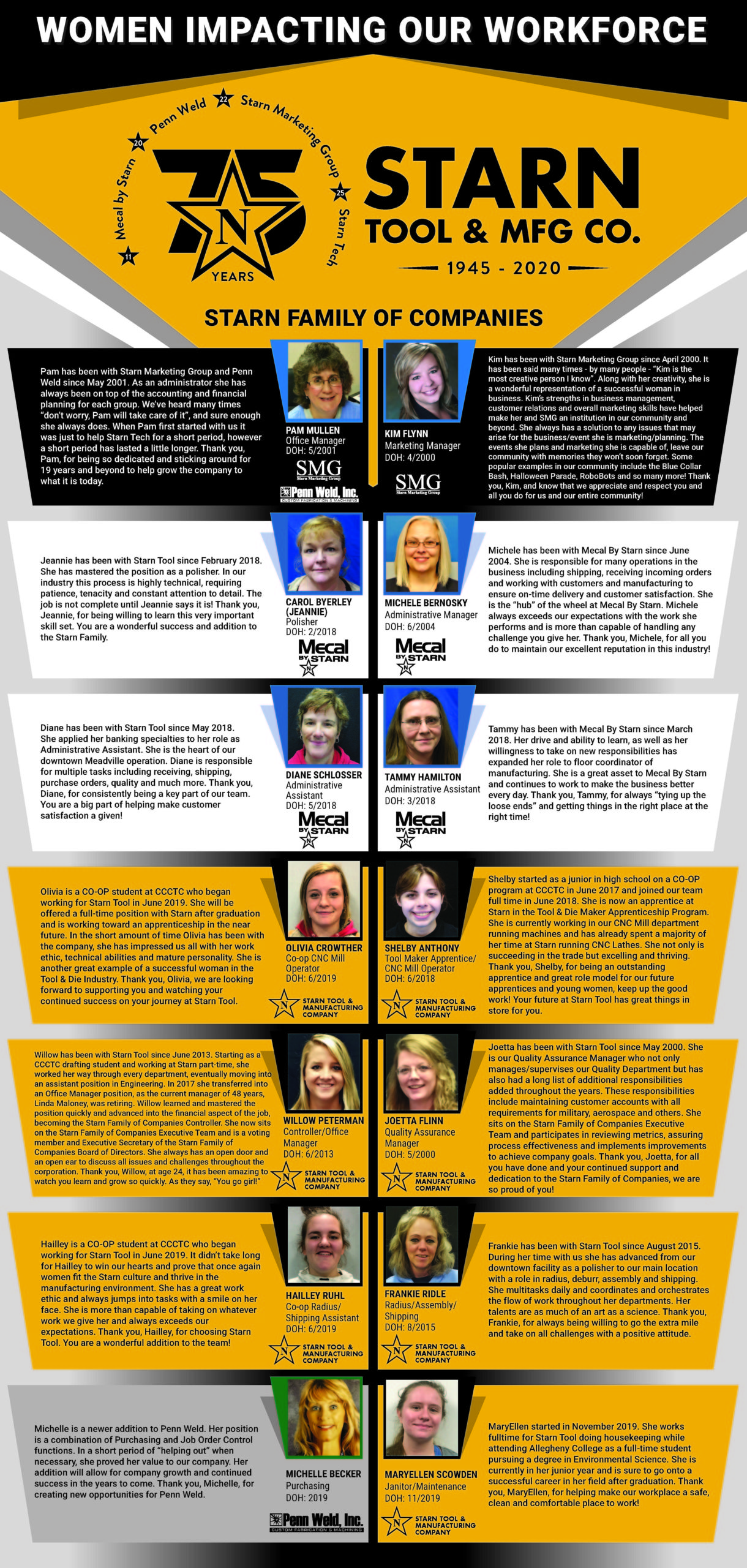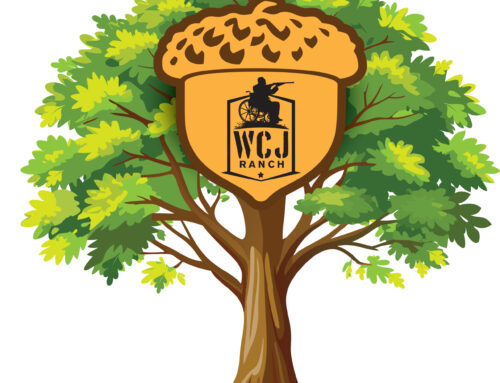

An estimated 360,000 manufacturing jobs in the U.S. were unfilled at the end of 2019, according to the U.S. Department of Labor’s Bureau of Labor Statistics.
Add to that number a projection that 4.6 million manufacturing jobs will be needed during the decade with the possibility of the bulk of them unfilled due to a lack of skilled workers.
Showing women the job opportunities available in manufacturing is key, but projecting manufacturing as a profession for women is crucial, according to women involved in manufacturing in Crawford County.
“Part of it is making it recognizable as something they can do. I know they can,” said Elisabeth Smith, president and chief executive officer of Acutec Precision Aerospace Inc. of Meadville. She leads a company that has around 500 employees locally with about 25 percent of its workforce women.
While predominantly male-dominated, tooling and machining companies, the backbone of manufacturing in Crawford County, have been seeing more women entering the field.
The number of open jobs in manufacturing is expected to grow substantially nationwide as this decade unfolds, according to a study released in late 2018 by Deloitte, a U.S.-based international business consulting firm, and The Manufacturing Institute.
“With nearly 2 million vacant new jobs expected by 2028, compounded by 2.69 million vacancies from retiring workers, the number of open positions could be greater than ever and might pose not only a major challenge for manufacturers but may threaten the vitality of the industry and our economy,” according to the study.
Another report done in 2017 by Deloitte and The Manufacturing Institute found women constitute one of U.S. manufacturing’s largest pools of untapped talent. Women totaled about 47 percent of the U.S. labor force in 2016 but only 29 percent of the manufacturing workforce, according to that report.
Key role in county
Manufacturing is important to Crawford County because there is a heavier reliance on it here than in other parts of Pennsylvania and the country.
About 23 percent of the jobs in the county are related to manufacturing, compared to 10 percent for the state and 8.5 percent nationally. Many of the area’s tooling and machining shops are suppliers of tools, equipment and parts to major manufacturers.
If manufacturers — locally and nationwide — hope to fill the openings, they must make sure women are welcome, that they understand what’s needed to enter this career field and that they have access to programs that build basic skills.
“It’s showing them what’s possible and offering more opportunities to play in that arena,” Smith said.
Acutec recently hired two engineers who are women plus two of its account managers are women as well, according to Smith.
“We’re trying to find the best people to hire — that’s our priority,” Smith said.
Tami Adams agrees that manufacturing is starting to be shown more as a profession — not just a job.
Adams is executive director of the Northwestern Pennsylvania chapter of the National Tooling and Machining Association, a trade group for the tooling and machining industry.
“We’re seeing an increase in women on the floor and in leadership positions,” Adams said. “The more leadership we have, then they’re the role models that brings the interest in” among young women.
Key executives
There are a number of tooling and manufacturing firms in the area that are led by women or have women in key executive positions — Acutec, Area Tool & Manufacturing Inc., Optical Filters Inc. and Kuhn Tool & Die to name a few.
Adams is a third-generation in the tooling and machining industry. Her grandfather, Hank Sippy, founded the former Sipco Tool and Die Co. which then was run by her father, Larry Sippy, and her uncle, Lon.
Growing up in a manufacturing family, Smith got her professional start in economic litigation consulting after graduating in 2004 from Haverford College with a bachelor’s degree in economics and mathematics. Her undergraduate thesis was on the gender wage gap for executives.
She went to the Paris Air Show in the mid 2000s and saw there were very few women in the aerospace industry at the time.
“I thought I could do more to advance women in industry by being one, rather than just analyzing it from the outside,” Smith said.
That led Smith to get a master’s in business administration in manufacturing operations from the University of Michigan. She then entered the operations leadership program at United Technologies Corp., rotating through its aerospace divisions, holding positions at Pratt & Whitney, Hamilton-Sundstrand, and Sikorsky Helicopter.
She then spent two years as a manager on the Blackhawk UH-60M Medevac helicopter final assembly line for Sikorsky before returning to Meadville in 2013. In mid-2013, Smith became director strategic operations at Acutec and later its quality director.
Since December 2014, Smith has been Acutec’s president, chief executive officer and majority owner, taking over for her father, Rob Smith, who serves as executive chairman.
‘Isn’t anything unheard of’
Bonnie Kuhn, vice president of Kuhn Tool & Die, joined the firm in sales in 1991.
Kuhn said she doesn’t see challenges in manufacturing today for women based on their gender.
“I say that because our customers acknowledge women in today’s times,” Kuhn said. “They’re working with a lot of women engineers, women who are on the (shop) floor. So having a woman come in and talk about their tooling (needs for their business) isn’t anything unheard of.”
Kuhn’s business has evolved over the years — going from dealing with third-tier companies in a supply chain to dealing with first-tier companies, she said.
“Within those companies, there’s a lot of women engineers,” Kuhn said of first-tier manufacturers.
Kuhn said she learned about manufacturing from watching and learning over her time in the business.
“I can go in to a company and try to help them solve problems that they’re having, but I can’t know the technical side of how to do it,” she said.
That’s where her husband, Ken, the firm’s president who handles the engineering side, steps in.
When it comes to things like finding new equipment or purchasing, Kuhn herself spearheads the projects.
“Not because I know five-axis milling, but because I’m able to get info, research it and come up with what I think is best for us, but I don’t make decisions just on my own.”
Kuhn sees more girls and young women becoming interested in manufacturing because of things like the RoboBOTS initiative. RoboBOTS is a robot building and battle competition that’s been held in Meadville for more than a decade.
“Hands-on has a lot to do with it,” Kuhn said. “With RoboBOTS, I’m amazed at the number of girls, young ladies who are in there. They want to go on into engineering type of careers because they’re not being told ‘you can’t do that’ but because they can do that.”
Kuhn’s granddaughter is pursuing a possible career path related to manufacturing as she’s in high school and in the electronics program at the Crawford County Career & Technical Center.
Making it a career
One young woman who’s pursuing a career in manufacturing is Shelby Anthony, a second-year apprentice at Starn Tool & Manufacturing Co.
She’s in her second year of a four-year NTMA-approved apprenticeship program. It requires successful completion of 8,000 hours of work experience plus 576 hours of classroom work over the period before the person is considered a journeyman in the tooling and machining trade.
“It’s more hands on now, working on different machines,” Anthony said. “I like learning different machines and having more having challenging work all the time.”
Anthony said she enjoys the challenges of making things and figuring out how to do it.
“Your mind has to be sharp, you always have to be paying attention and stay focused all day,” she said. “I can do it just as good as the guys can.”
Research in the Deloitte/Manufacturing Institute report on women in manufacturing showed gender diversity benefits a manufacturing organization through improved ability to innovate, higher return on equity and increased profitability.
“When employees believe that their organization is committed to inclusion, they report better business performance in terms of their ability to innovate,” the report found. “Organizations can also unleash the full potential of their female workforces by creating a culture where unique strengths thrive.”
That’s something with which Smith agrees.
“If we make the workplace a nicer place to be, everybody benefits,” she said.
*Article published by the Meadville Tribune




